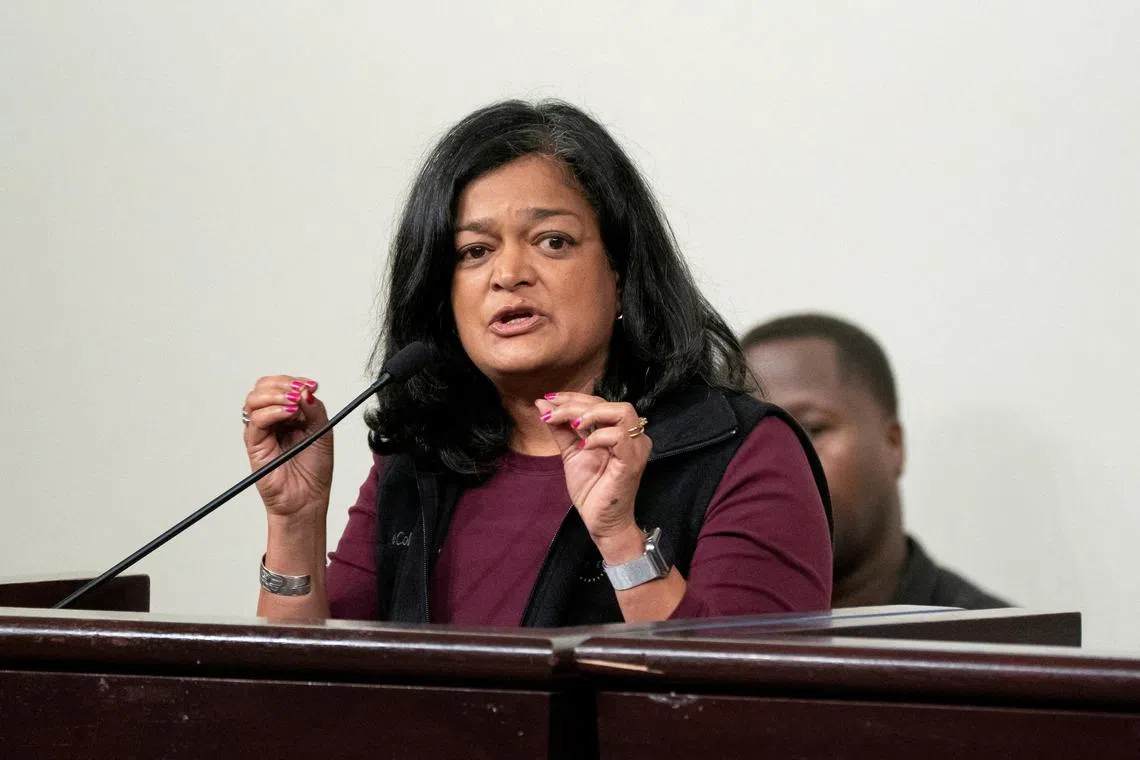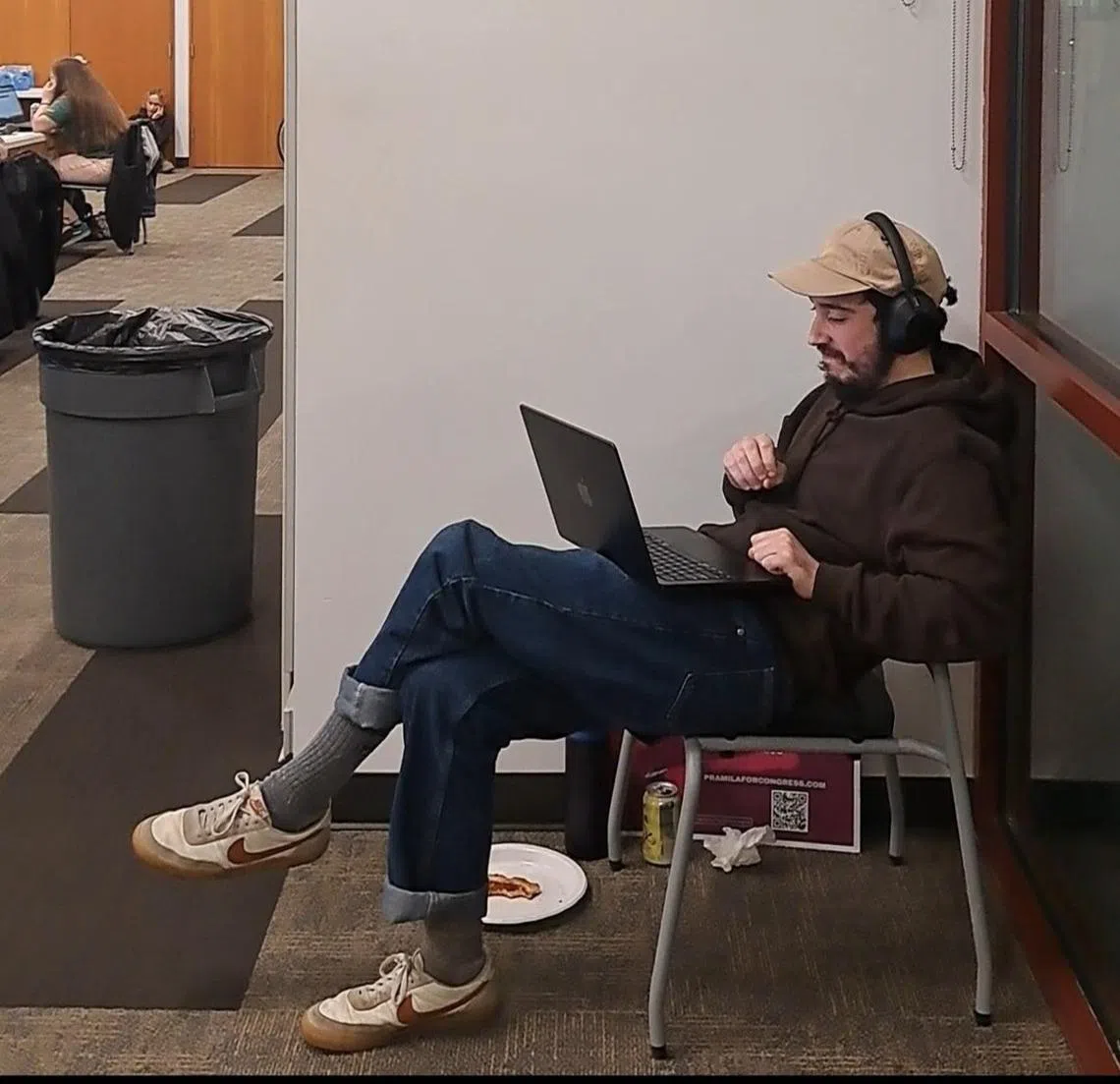A snapshot of volunteers who give their time to help put Kamala Harris in the White House
At the party’s phone bank in Seattle, volunteers make cold calls to connect with voters and make a final pitch for the sitting vice-president

[SEATTLE] Grassroots activist Steve Williamson first laid eyes on US Congresswoman Pramila Jayapal of Washington’s seventh congressional district in 2001, shortly after the 9/11 terror attacks.
He was then leading the central body of labour organisations in King County in Washington state, and had pulled together grassroots groups for discussions on how to unite the community to quell the backlash against ethnic minorities.
She was at that table, and it was how they met. “But she doesn’t remember me from that. I was just some other white dude in the audience,” he quipped.
Two years later, they were thrown together – again through their involvement in grassroots work. Williamson was then headed for Seattle as part of a lobby group for immigrants’ rights, so he invited her to co-chair the lobbying effort with him.
The rest, as they say, is history. He has now been married to her – the first South Asian American woman elected to the US House of Representatives – for 14 years. And Congresswoman Pramila Jayapal happens to have a connection to Singapore – she was born in India, but grew up in Singapore and Indonesia, and is an advocate for women’s, immigrant, civil and human rights.

This year, she is running for re-election in Washington state’s seventh congressional district, which encompasses most of Seattle on the US west coast and its surrounding areas. Her opponent is Republican Dan Alexander, who is making his maiden attempt at winning a congressional seat.
To help her keep her seat, she is counting on a bunch of volunteers at the Democratic Party “phone bank” – people who work the phones, calling up voters to persuade voters to go vote, and to do so in such a way that the tallied numbers in the electoral college would eventually put Democratic candidate Kamala Harris in the White House.
She told reporters in Seattle on Oct 29: “This election is very crucial for the rest of the world, because whether you think about Asean (or) any multilateral organisation, the reality is that the US has a tremendous role to play in investment in those countries, and making sure that we are investing in democracy, diplomacy and development.
“Obviously, the US has a lot of influence on what happens around the world, so we are aware of the responsibility that that involves.”
The Seattle Labor Temple, where the Democrat phone bank is stationed, was a hive of activity this past week. There, more than 20 volunteers, armed with laptops and earphones, were calling voters in Arizona and the other six swing states – Georgia, Michigan, Nevada, North Carolina, Pennsylvania and Wisconsin – who are expected to decide the outcome of the election.
“Having a swing state means you have to go and convince enough people in that state to vote so that you win the electoral vote,” she said. “What you’re seeing in this room tonight is all about making sure Kamala Harris gets elected to the White House.”
Among the phone bank volunteers was Glenn Young Haider, the lyricist and lead vocalist of Seattle-based indie folk band Racoma. He had just come from his day job – he is a purchaser for a harp manufacturer – but was looking at spending the evening on the phone, talking to voters he doesn’t personally know.

A Democrat his entire adulthood, the 33-year-old had sped home after a full day’s work, grabbed his laptop and some cashews for a snack, and then driven 35 minutes to the phone bank. By 7 pm, he was on his first call.
His opening line: “Hi, my name is Glenn, and I’m a volunteer at the Democratic Party. How’re you doing today?”
Only one in three people who answer the phone talk, he said. But not everybody is hostile.
The key is to build a relationship, he said. “Connect, just connect. People want to be heard, and if you can give them a moment to voice their concerns, they stay on the line.”
He made about 15 calls in his first hour.
The nicest person he talked to that day was a 90-year-old farmer. “He was telling me forever about his farm, but he’s really sweet. He just seemed old and, you know, old people want to talk because they seem lonelier.”
He hesitated, however, when asked whether he would return to the phone bank. It would be much easier, he said, if the calling could be done from his home. “I live far away, and after working all day and not eating, I don’t want to travel so far.”
The way he sees it, volunteering at a phone bank is a highly emotional experience.
“People are hanging up on you and telling you to stop calling. You have to take all of that in,” he said.
Decoding Asia newsletter: your guide to navigating Asia in a new global order. Sign up here to get Decoding Asia newsletter. Delivered to your inbox. Free.
Copyright SPH Media. All rights reserved.

